Why Progressives Don't Care For Black Lives
"Black Lives Matter" signs are everywhere in progressive cities like San Francisco. But so too are black people dying on sidewalks. Why is that?
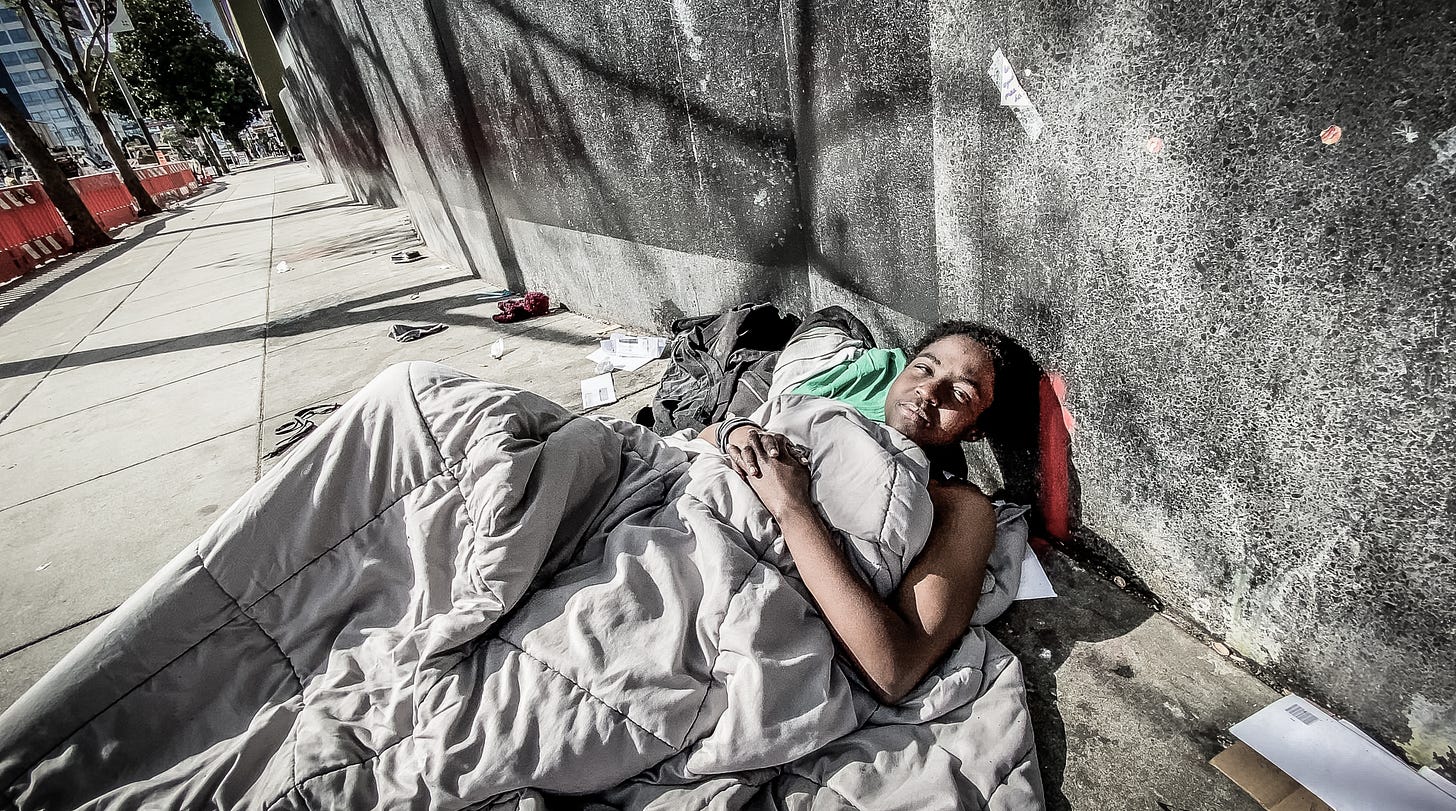
It is hard to find a city in America whose residents say they care about black lives more than San Francisco. Two weeks after Donald Trump was elected president in 2016, the San Francisco Board of Supervisors affirmed in a resolution that “Black Lives Matter.” In response to a police officer killing George Floyd in 2020, more than 1,000 San Franciscans marched under the banner of “Black Lives Matter.” And, later that same year, San Francisco Mayor London Breed promised to defund the police and spend the money saved on black lives.
And yet, for a city that says it cares so much about black lives, it’s hard to find a city that does a poorer job of caring for them. Two weeks ago I checked in on a black man in his early thirties named Korey Gibson who I had discovered living in a nest of garbage in the South of Market neighborhood. Korey suffers debilitating pain and smokes fentanyl and meth during much of the day. When I arrived, I discovered a young, naked, and psychotic black woman wrapped in a dirty blanket lying just a few feet away from him.
I don’t doubt that progressives feel sympathy toward Korey, the young mentally ill woman, and other black people experiencing homelessness in San Francisco. Research suggests that politically liberal and progressive people express, in general, greater compassion toward the misfortunate than do more politically conservative individuals. San Francisco spends an astonishing $1 billion per year on around 10,000 homeless individuals who are disproportionately black.
And yet progressives aren’t caring properly for mentally ill and drug addicted homeless people of any color. The governments of nations like the Netherlands, Portugal, and Switzerland, which progressives have for decades held up as model nations when it comes to drug policy and health care, do not allow mentally ill and drug addicts to use hard drugs publicly, camp anywhere, and steal hundreds of dollars of goods monthly with no consequence. Nor do they allow naked psychotic women to become vulnerable to sexual violence on their sidewalks.
It’s not like progressive San Francisco officials don’t know what’s happening. The San Francisco Department of Health estimated three years ago that 4,000 of San Francisco’s homeless have a history of both serious mental illness and substance abuse disorder. “And of those 4,000 individuals,” said San Francisco Mayor London Breed in 2019, “35 percent are African Americans despite the fact that we have a less than 6 percent population of African Americans in San Francisco overall.”
What, then, is going on? Why are progressives, who say they care so much about black lives, sacrificing so many of them?
San Francisco’s Heart Of Darkness
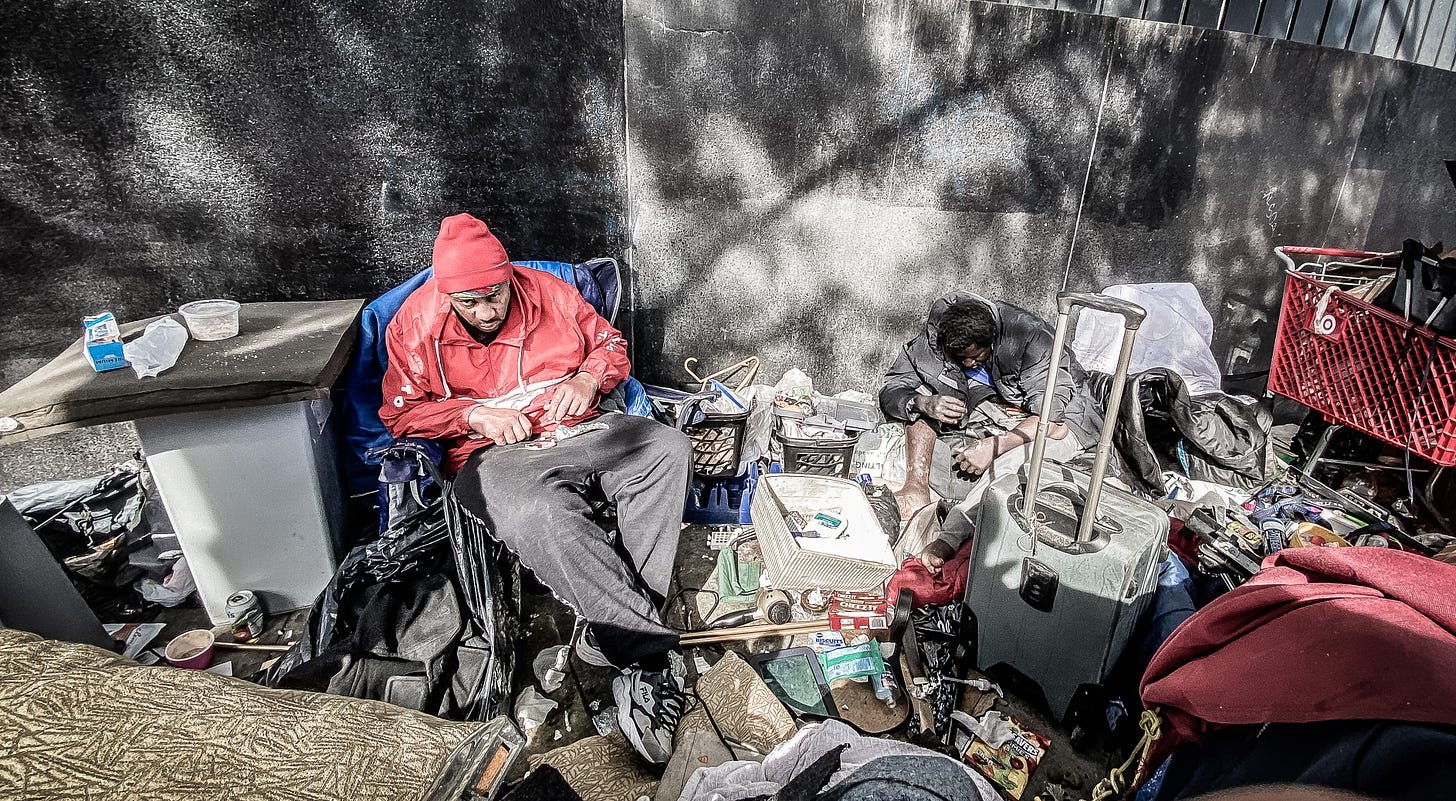
When I encountered the mentally ill naked woman, Korey and a companion were smoking fentanyl and meth. I asked them if they knew her and they said they didn’t. I went over and asked her what her name was, and how old she was. She babbled something unintelligible and rolled over. She appeared psychotic.
After I got home I called the police. I told a dispatcher I thought she was under 18 years old. They said they would send someone to check on her. I gave them my phone number and offered to send them a photo. They said they would be in touch.
I next shared a photo of the young woman with several people including “Sue,” a homeless outreach worker who asked that I keep her identity confidential. Sue said she knew the young woman, told me her name, and asked me to also use a pseudonym for her. “She is super vulnerable and very sick,” said Sue. “She’s mentally ill and drug addicted and homeless.”
“Why won’t the cops do anything?” I asked.
“The cops would say she’s addicted and homeless and is consenting,” said Sue.
“But she was naked,” I said.
California law allows police to arrest and place a person on a 72-hour long psychiatric hold, known as a “5150,” after the section of the legal code, if they are naked and psychotic. The same section allows for a psychiatric hold of someone defined as “gravely disabled.”
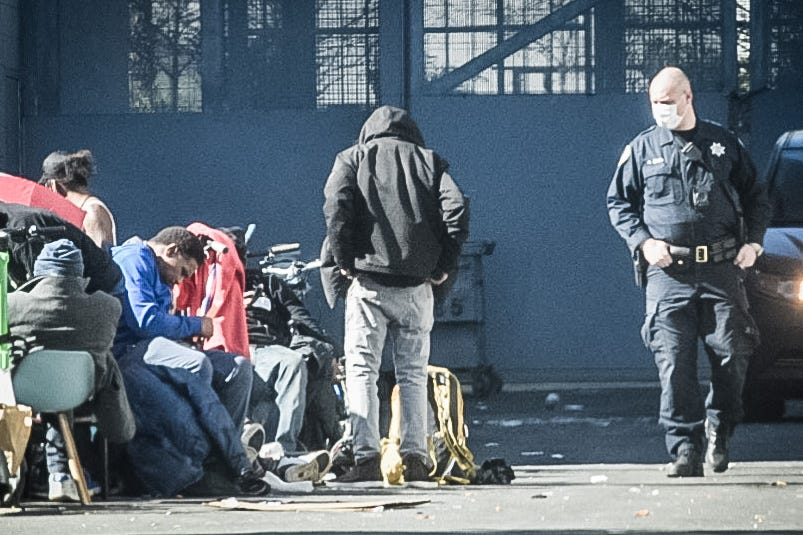
“If somebody like her wouldn’t give you her name or tell you what year it is, she doesn’t have decision-making capacity,” agreed Sue. “They can 5150 her if they wanted to but they don’t. My experience with SFPD is that they have a very different perspective on doing a 5150.”
Sue told me she had recently discovered a psychotic naked man eating cardboard outside of a Safeway. Sue called the police but the arriving officers would not arrest the man.
“He was confused, didn’t know his name, and thought he was from a different planet,” said Sue. “He was completely naked and the police did not do a 5150 on him. I know, based on the criteria for ‘gravely disabled,’ that he is 5150-able. But they said, ‘Is he threatening anyone?’
“The cops say, ‘He’s not committing a crime.’ I say, ‘He’s naked,’ and they say, ‘It’s not illegal to be naked in California.’ They want to hear the magic words of, ‘I’m going to kill myself,’ or ‘I’m going to hurt someone else.’ Without those, they won’t be 5150’d.”
“But what if you’re at risk of being hurt by others because you’re psychotic?” I asked.
“If your family members are struggling you can file conservatorship request with the courts,” Sue said. “But then they have to appear in court. And how do you get them to go to courts?”
This was the problem with Korey. He is addicted to fentanyl and meth and does not want to go to the hospital. He may suffer from mental illness; Sue said doctors diagnosed both his parents with schizophrenia. When I first reported on Korey, people on Twitter accused me of violating his privacy. But it was thanks to that video that Sue tracked down his sister, Keneda, who I brought from Oakland to San Francisco last Wednesday to search for him.
Keneda told me that Korey had graduated from high school in 2009, become a father early, and then moved to Las Vegas, where he was shot in the groin in retaliation for defending himself against an attacker. He became addicted to pain pills and then to heroin and fentanyl.
Keneda and I looked for Korey where I had twice met him, on Mission between 8th and 9th, but he wasn’t there. Keneda and I went to lunch and decided to look again afterwards.
The week before I had discovered a terrible scene of open drug use in a little alley called Laskie Street off Mission Street between 8th and 9th. Residents of the street were so intoxicated and psychotic from fentanyl and meth they could barely speak to me. I made a video based on the interviews and posted it to Twitter (above).
I suspected Korey might have moved to Laskie. Sure enough, Keneda discovered him on the sidewalk. I caught their embrace on camera. When I looked at the photo later I realized they were flanked by a person smoking meth and another nodding, likely from fentanyl.
Keneda had brought Korey French toast and balm for the wounds on his lower legs, which he had been cleaning with Clorox bleach wipes. Korey’s feet were swollen to twice their normal size. He was wearing a diaper.
It’s the ACLU, Stupid
When you ask progressives why there are so many mentally ill people on the street, many blame former California governor, Ronald Reagan, and say the problem is that California does not spend enough on mental illness. But by the time Reagan took office in 1967, 55 years ago, nearly half of the patients in California’s state mental hospitals had already been released. And money isn’t the problem.
“There’s a shitload of money,” a mental health advisor to Governor Gavin Newsom, psychiatrist Dr. Thomas Insel, told me last year (see video embedded in the Tweet above). “We think $11 billion goes into California’s state mental health budget every year. That makes California the number one in per capita spending in the United States. No state spends as much as we do.”
Even after San Francisco in 2019 changed the rules on who could be mandated psychiatric and addiction treatment, it’s occurred with just two people over the last two years. Progressives, led by the ACLU, insist that addicts and the mentally ill, including Korey and Jane Doe, not be required to accept shelter or medical treatment, even if it means dying and being raped in tents on the city’s sidewalks.
Governor Gavin Newsom in January 2020 promised to address the issue, by making it easier for people like Keneda to commit their loved ones to the hospital. But people close to Newsom say he won’t cross the ACLU and George Soros, who gave Newsom $1 million last year.
In San Fransicko I describe how the ACLU justifies its position. Its senior attorney told me that homeless mentally ill people are too impaired to be held accountable for breaking the law, but not impaired enough to justify the same kind of treatment we provide to other people suffering mental disabilities, such as dementia.
Why? Because ACLU and other progressives adhere to victim ideology, which holds that things must only be given, and nothing demanded, including compliance with laws against public camping and drug use, to people designated victims, a category that includes people who become homeless due to their untreated mental illness and addiction.
“The same people who would not hesitate for a moment to force treatment on a 72-year-old woman with dementia, who walks out in the street naked in the middle of winter, are having a hard time with a 22-year-old with another kind of brain disease [drug addiction], who does the very same thing, because they think it's more compassionate not to force treatment,” said Insel. “It's a little bit of a double standard amongst the ACLU.”
The double standard creates victims in the real world. After giving Keneda and Korey some time alone, I identified myself as a reporter to two individuals a few feet away. Both agreed to be interviewed. Both said they were fentanyl and meth addicts. Both told me, on the record, that they had been raped recently. And both said, contra my critics, who demand I give “privacy” to addicts living in public spaces, that they wanted people to know their stories.
As for the naked psychotic woman, I never heard back from the police, and have not seen her again after multiple search attempts.
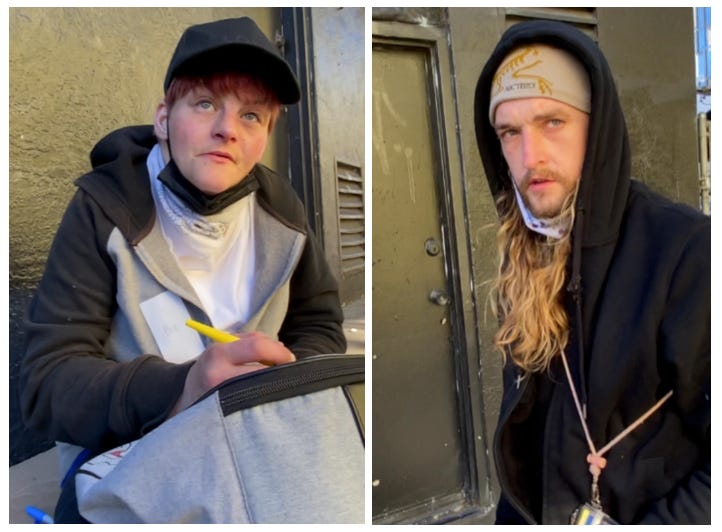
“It’s a Leadership Problem”
What has occurred in San Francisco and other progressive cities is the triumph of evangelical Wokeism over evidence-based medical care. Many progressives are well-meaning. Others, like the San Francisco Coalition for Homelessness, defend open drug scenes, including ones populated by pregnant addicts. Radical Left activists at the Coalition, openly at war with “capitalism,” use appeals-to-emotion, and bullying, to demonize those who advocate mainstream addiction medicine and psychiatry.
The humane alternative to what San Francisco is doing exists in every civilized nation, including Netherlands and Portugal. It includes arresting addicts who break the law, offering drug treatment and/or psychiatric care, and making cash and housing contingent upon individuals taking responsibility for their behavior.
Arresting addicts and the untreated mentally ill when they break laws is not the same as incarcerating them. Korey and the mentally ill young woman don’t need to go to prison, they need to go to the hospital, to rehab, and eventually to residential care.
The good news about the humanitarian disaster is that confronting it is an opportunity for moderate liberals and moderate conservatives to come together around an agenda of enforcing laws, expanding conservatorship, and having the state of California take over addiction and psychiatric care from the counties through a new agency, Cal-Psych.
All of that will require new political leadership. “The barrier I kept coming up against,” said Insel, “was everybody said ‘no.’ The constitution requires that this be done at the county level. But you're going to ask every county to do its own workforce development? We need state leadership.”
Six times in our interview Insel blamed lack of leadership. “It’s very hard to do that county by county,” he said. “It takes the state. It takes Gavin Newsom sitting down with the private sector to say, ‘Hey guys, this is a statewide problem. Let's solve this together.’ Kaiser's willing to do that, but nobody's asking because there's no state leadership.”
Change is in the air. Today, a growing number of Democrats, and ACLU supporters, view Wokeism as not only annoying but actively harmful. “I started from a civil libertarian perspective,” said Insel, “but, at the end of the day, I just don't want to see people die with their rights on. That's not the solution. You want people to take their medicine and stay in treatment.”
As such, the change that is required to save black lives has less to do with overcoming racism in policing and more to do with overcoming pseudoscience in progressivism. If we truly care about the lives being lost on the streets we need to persuade our fellow citizens not just that the lives of addicts and the untreated mentally ill matter, but also that many of them can only be saved by police officers arresting them.




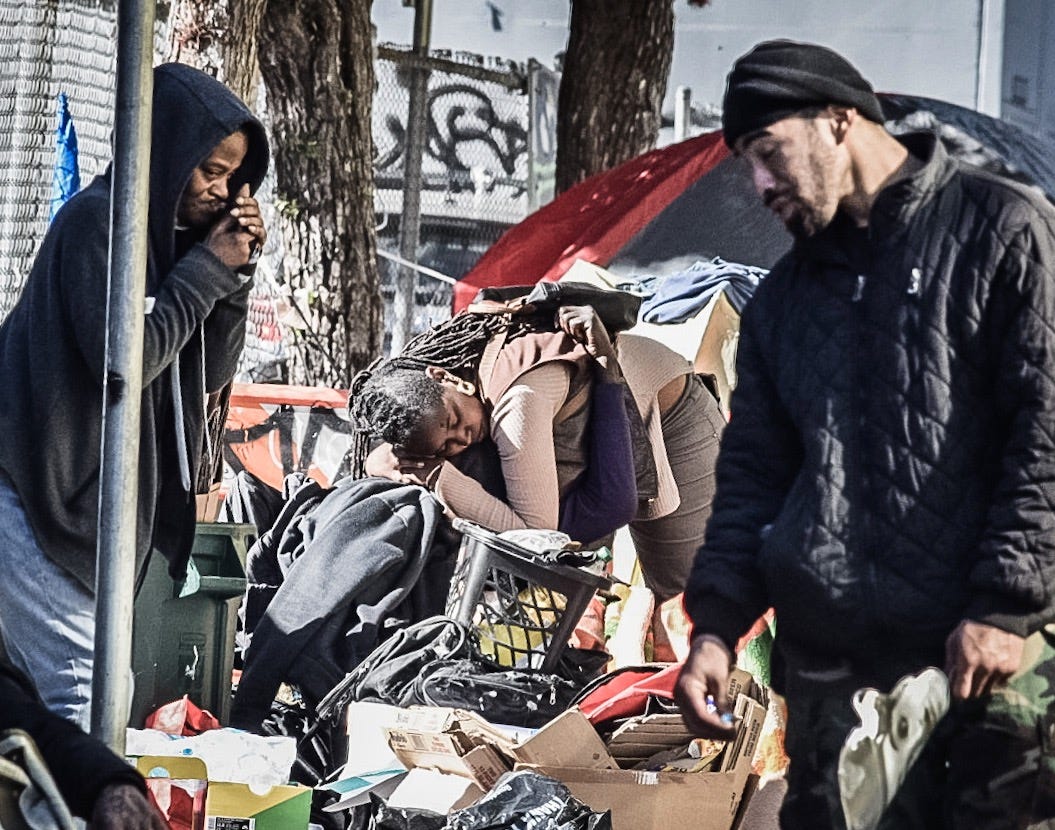

Absolutely impeccable journalism. This issue needs a blinding UV spotlight on it until it disinfects the entire situation for good. Finding out where the billions of dollars is going would be worth taking a look at. There are people stuffing their pockets, do doubt. Disgraceful. Need to find out who these people are and expose them for their gross incompetence, and possible fraud. While I understand no one likes to take responsibility in wokesim, they will run out of places to hide.
99% of the time, 5150 is a waste of everyone’s time. The sick person is taken to the Sheriff, or to some sort of “evaluation” facility. Minimal effort is spent trying to figure out what is wrong with the person. There may or may not be even an interview. Most of the time the upshot is that the person is released.